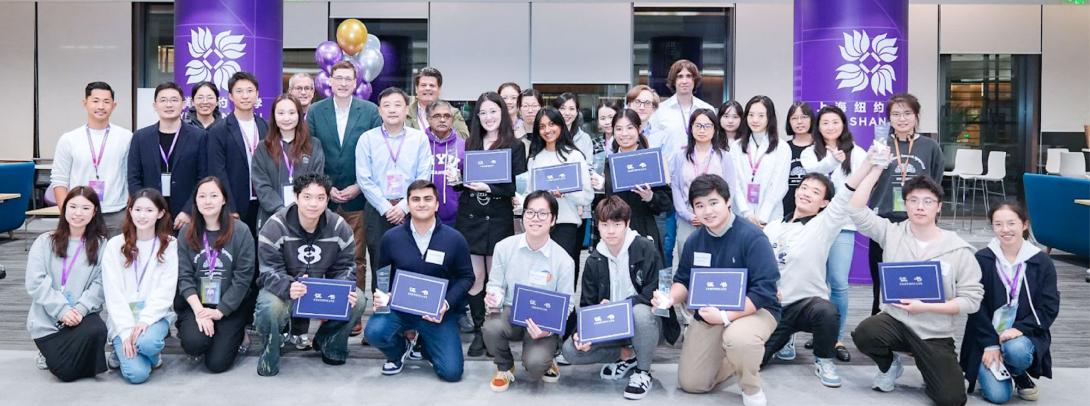Undergraduate students presented their research projects on a range of issues, ranging from postpartum mental health to China’s labor market, at the Fall 2024 Undergraduate Research Symposium on November 8. The semi-annual symposium gives students an opportunity to showcase the research they have been working on with faculty in business, economics, humanities, IMA, social sciences, and STEM.
“It was inspiring to see the dedication and depth that students brought to their research,” said one of the faculty judges, Assistant Professor of Sociology Angran Li. “The presentations highlighted not only their intellectual curiosity but also their remarkable ability to engage with complex and important research questions.”
The symposium highlights NYU Shanghai’s emphasis on supporting undergraduates to engage in research. “Undergraduate research is essential at NYU Shanghai because it encourages students to cultivate a mindset of inquiry and critical thinking," said Professor of Accounting Sterling Huang. “This experience not only enriches their academic journey but also equips them with skills that will serve them well beyond the classroom. It’s a privilege to witness and support this development.”
Below are the winners for Best Research Project and Best Presentation in Business and Economics, Social Science, and STEM, as well as Most Popular Project, as voted by attendees of the symposium.
Business and Economics
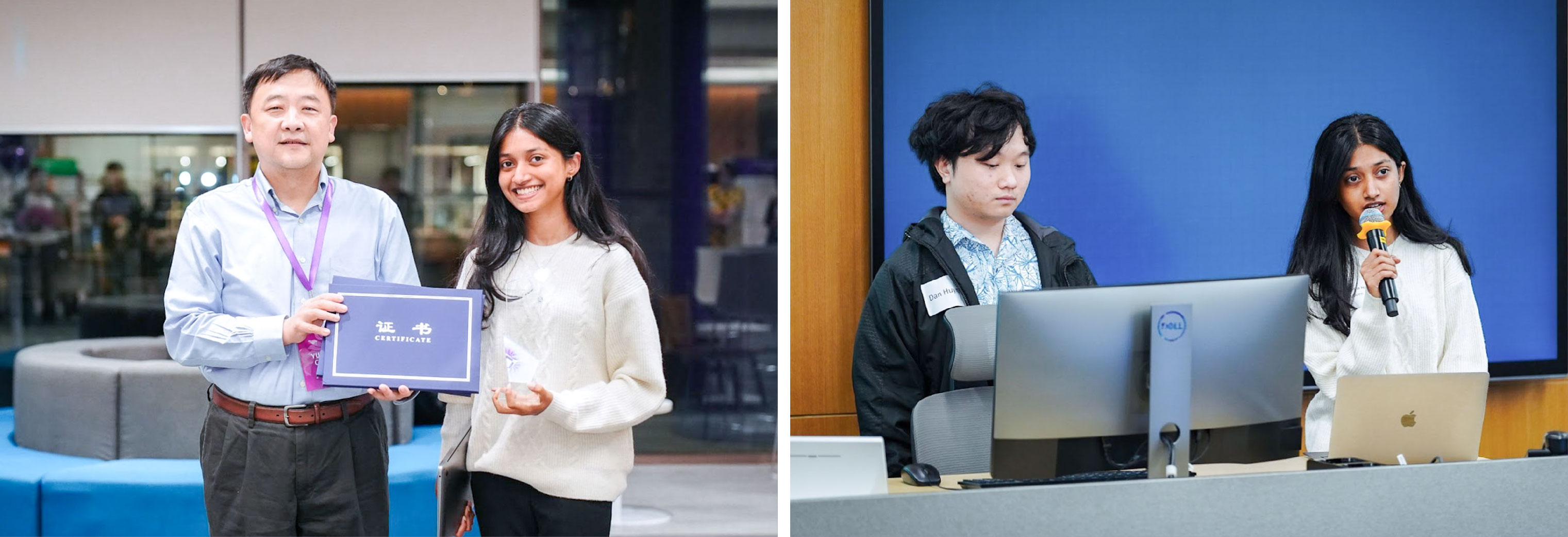
Best Research Project
China's Labor Market: Lying Flat
Researchers: Dan Huynh ’25, Shahama Samsudeen ’25
Faculty Mentor: Joseph Foudy
Why did you choose this topic?
Shahama Samsudeen: I took a class called Asian Economies during my study-away semester at NYU Stern, where we touched on this topic. Since I’ve lived in China, I was interested in learning more about the local labor market and social systems, especially the hukou system. I came across some truly interesting papers about it and I realized how deeply hukou affects China's growth and its people. In the end, my partner and I decided to explore how labor markets are specifically impacted by hukou. We also saw how much power this system–hukou–holds in shaping outcomes in China’s labor market.
What advice would you give to other undergraduate students who want to engage in research?
Choose a topic you’re genuinely passionate about. If you care about it, then you’ll be more motivated to put in the time and effort, which is really important since you’re working on it over the summer. Research often requires days of reading and annotating 10 to 20 page papers or even longer ones, so picking a subject you’re truly interested in makes that process much more engaging.
What was it like working with your faculty mentor?
Working with our mentor, Professor Foudy, was really great. He provided thorough feedback, helping us refine our thesis and guiding us through the process. I’m truly grateful for his support and I actually hope to develop this research further in my capstone project, building on some of his ideas and feedback.
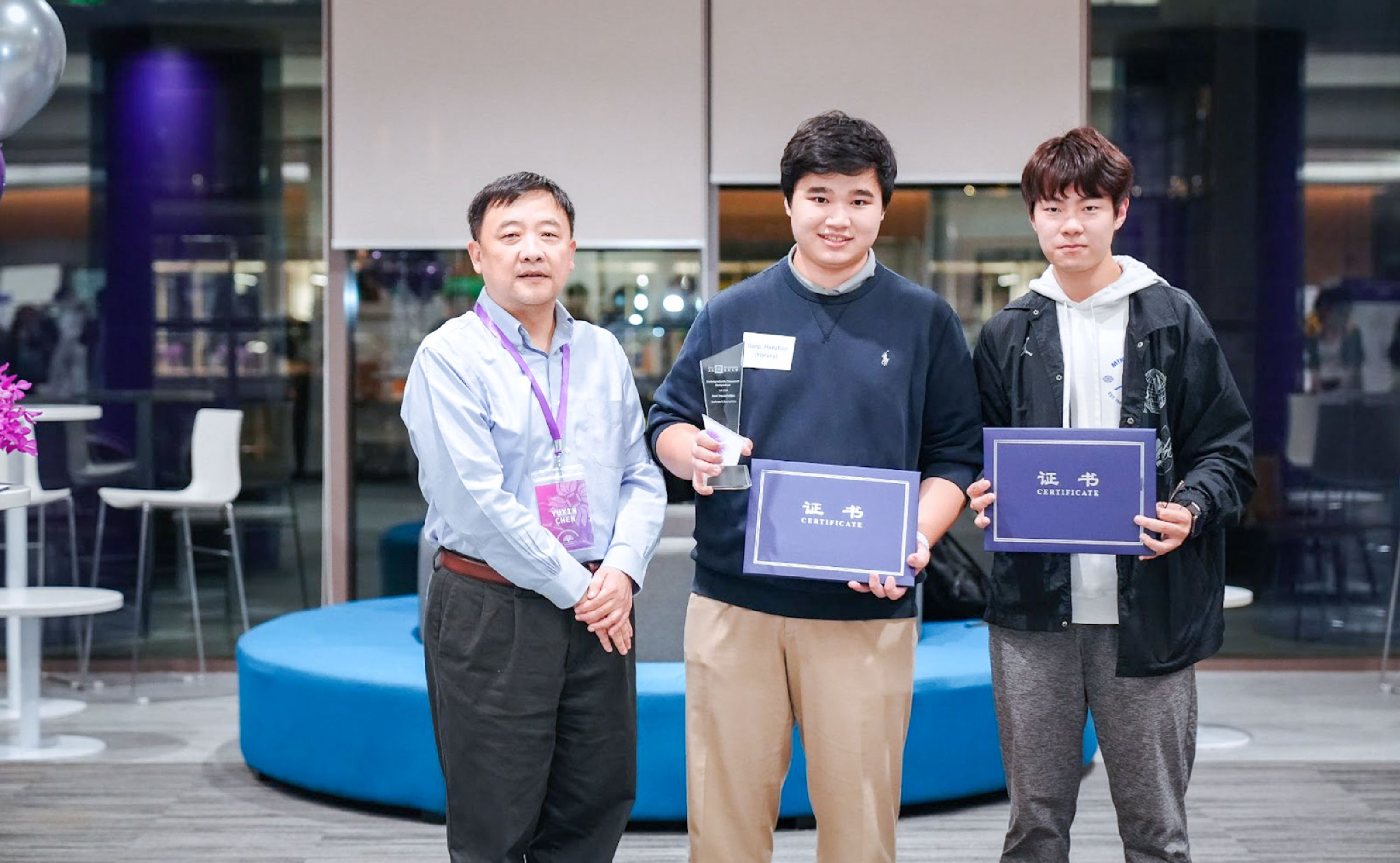
Best Presentation
Strategic Timing of Implementation Interventions: Maximizing Impact with Varied School Event Incentives
Researchers: Harvey Jiang Haozhan ’26, Stephen Wang Tongyu ’27
Faculty Mentor: Weng Weiwei
Why did you choose this topic?
Harvey Jiang Haozhan: We had this initial expectation to find some task management methods that are somehow better than setting up deadlines since we often are unable to constantly commit to tasks throughout a long period of time. This project also came from my final project in the course Behavioral Economics. In order to get there, we need to figure out how students’ performance fluctuated before the deadline. We first resonated our research with an existing study that models the Temporal Motivation Theory (explaining how people’s motivation changes till the deadline), and we further got inspiration from a biological experiment testing level of performance with respect to different arousal levels (i.e. different levels of incentives).
What advice would you give to other undergraduate students who want to engage in research?
Research starts from curiosity, and there is never a question that is too tiny to be asked. Try to find answers to every possible question that interests you: if there is an answer, good to know! If there isn’t yet an answer, answer it by yourself, this can be your own breakthrough!
What was it like working with your faculty mentor?
Professor Weng Weiwei is renowned for her constant efforts to engage students while supporting them in seeking answers to their puzzles. We have tons of experiences and opportunities to share our thoughts on all different topics so I frequently drop by her office for conversations. We do have a mentor/friend-like connection and are really happy to see this happening.
Social Science
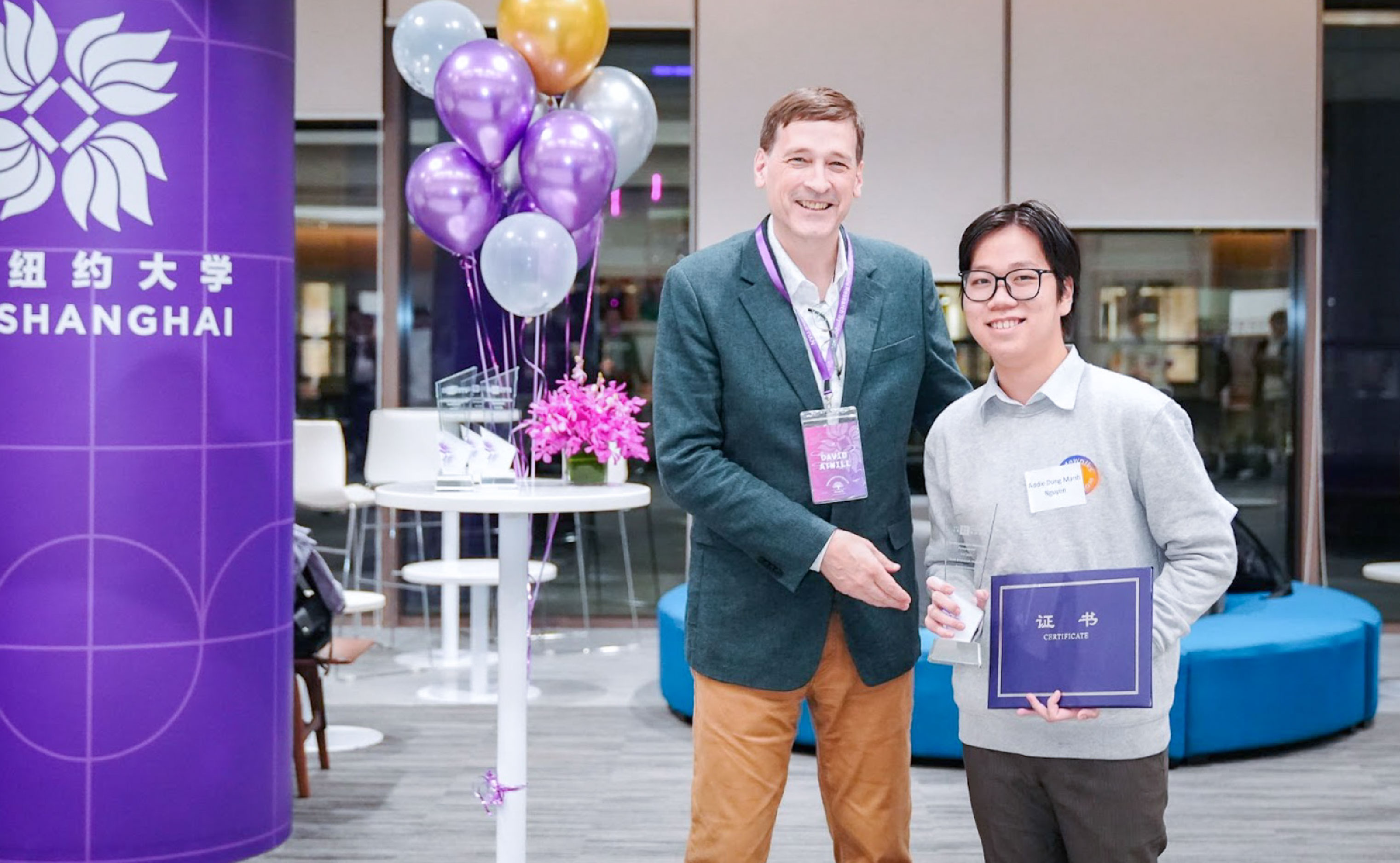
Best Research Project
Risk Factors Associated with Postpartum Mental Wellness and Childbirth Outcomes among Pregnant People in Da Nang, Vietnam
Researcher: Addie Dung Manh Nguyen ’27
Faculty Mentor: Etienne Jaime
Why did you choose this topic?
I chose my topic–maternal care and postpartum mental health specifically–because of my mother, my older sisters, my female cousins, and my aunts. Growing up and seeing most of them struggle with various aspects of pregnancy and childbirth, I have always wanted to do my humble part in improving healthcare conditions, especially in mental health, for pregnant and postpartum women in my country.
What was the most challenging part of this project?
The most challenging part of my project was traveling to different health centers throughout the project on my decade-old moped. Since we conducted interviews in eight health centers across my hometown’s neighboring city, I would get lost while getting to new health centers all the time. Yet now, looking back, I did get to explore a sizable portion of the city by accident.
What did you learn from this research and presentation experience?
I learned a lot from professors at the NYU Shanghai Center for Global Health Equity and other professors and health professionals in Vietnam, especially the intricacies of community health research. For the presentation, I did learn to rap as fast as Eminem. Since the project is a quantitative study, I had a lot of numbers and figures to present to the judges and the audience while introducing them to many other aspects of the study. Cramming everything into 3 minutes was a difficult task, but since the data analysis was done primarily by me, I learned all the numbers and results by heart.
What advice would you give to other undergraduate students who want to engage in research?
One thing I really appreciate about my research experience was that no professors I approached told me my project was impossible or that I should not pursue this path. So, for students thinking about doing research, my advice is to dream big but always be practical and pragmatic about your goals and your capability to carry out the project.
What was it like working with your faculty mentor?
I actually feel guilty for sometimes making my mentor, Professor Etienne Jaime, work during weekends and even his wedding preparation week on the IRB application and the poster. But he has been really supportive and meticulous in everything that I do. I have always been ambitious and precarious with the project, and my mentor would have to moderate that attitude with his down-to-earth style. Another thing is he always smiled at every meeting, even when the progress I had made was really terrible. That surprised me for the first few meetings, but it was always comforting to see him staying calm even when there were sudden obstacles in front of us.
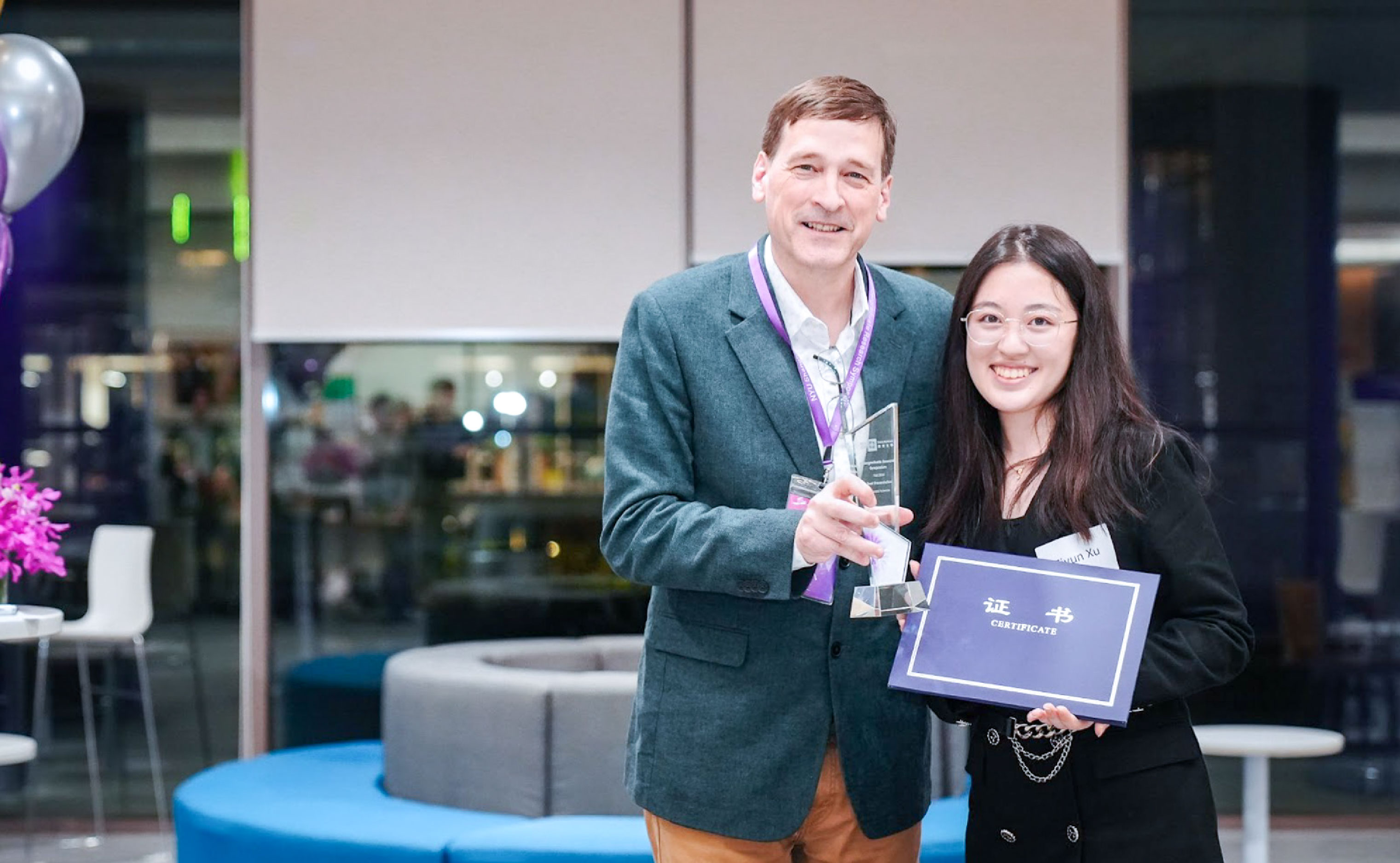
Best Presentation
Impact of Heatwaves on Urban Population Mobility: Focus on Chinese Megacities
Researcher: Xu Ziyun ’25
Faculty Mentor: Huang Kangning
What did you learn from this research and presentation experience?
I learned some hard skills through working with the GIS software and Google Earth Engine platform, which prior to doing this research I had not used. I also learned some presentation skills. I got a lot of feedback from professors and peers and will take that feedback into future presentations of my research. The symposium made me feel more confident in my research and presentation skills.
What advice would you give to other undergraduate students who want to engage in research?
Do not hesitate if you have something you want to research and explore deeper. I know a lot of students, including myself, think that research is a very far away thing, but NYU Shanghai has really excellent research resources. Professors are really caring and willing to help; they really do want to talk with students and do research with students.
What was it like working with your faculty mentor?
Working with Professor Huang Kangning is incredibly rewarding. He provides me with enough space to think independently and explore on my own, but at the same time he will also support me when I need help on some problems. He breaks down complex problems into more manageable parts that I can explore and learn from on my own, which has been helpful for me to make progress every week.
STEM
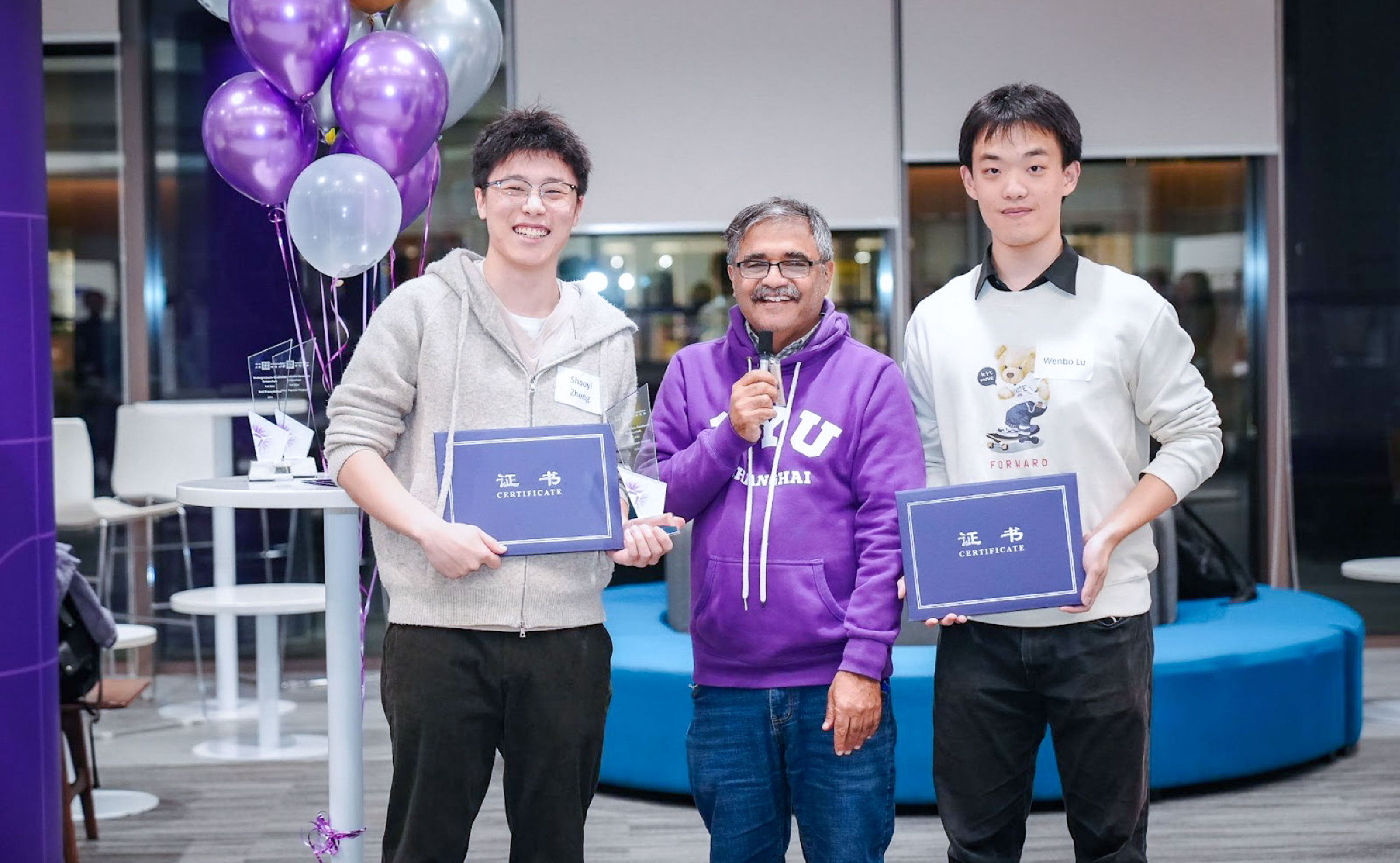
Best Research Project
ToMA: Token Merging with Attention for Diffusion Models
Researchers: Lu Wenbo ’25, Zheng Shaoyi ’25
Faculty Mentor: Wang Shengjie
What was the most challenging part of this project?
Lu Wenbo: The most challenging part of this project was shifting from a student mindset to that of a researcher. As a student, you are often presented with well-defined problems and a clear path to finding a solution. In research, however, the question itself may not be well-formulated and there’s often no unique or even best answer. Instead, you often find yourself in a cycle of exploration—trying new methods, getting expected or unexpected results, making sense of them, and shaping the problem as you go. This process of discovery was a significant aspect of our research journey, requiring patience and adaptability.
What did you learn from this research and presentation experience?
This research experience let me realize the value of seeking advice from experienced people around me, including PhD students, professors, and peers who have been in research longer. While figuring things out independently is beneficial, it can be time-consuming, and asking for help many times often helps avoid numerous pitfalls along the way. However, it’s essential to prepare questions thoughtfully, respecting others' time and maximizing the effectiveness of their input. Start early—start now, if you’re excited about research. In a research environment, you quickly uncover gaps in your understanding, and that sense of urgency drives a much deeper, more focused learning process.
What was it like working with your faculty mentor?
Working with our faculty mentor, Professor Wang Shengjie, has been absolutely amazing. He’s incredibly insightful, always pointing straight to the root of the problem when we’re lost. Beyond that, his support has been invaluable; he consistently takes the time to reassure us whenever we feel uncertain about our progress. His guidance is crucial in keeping us grounded and moving forward in the right direction.
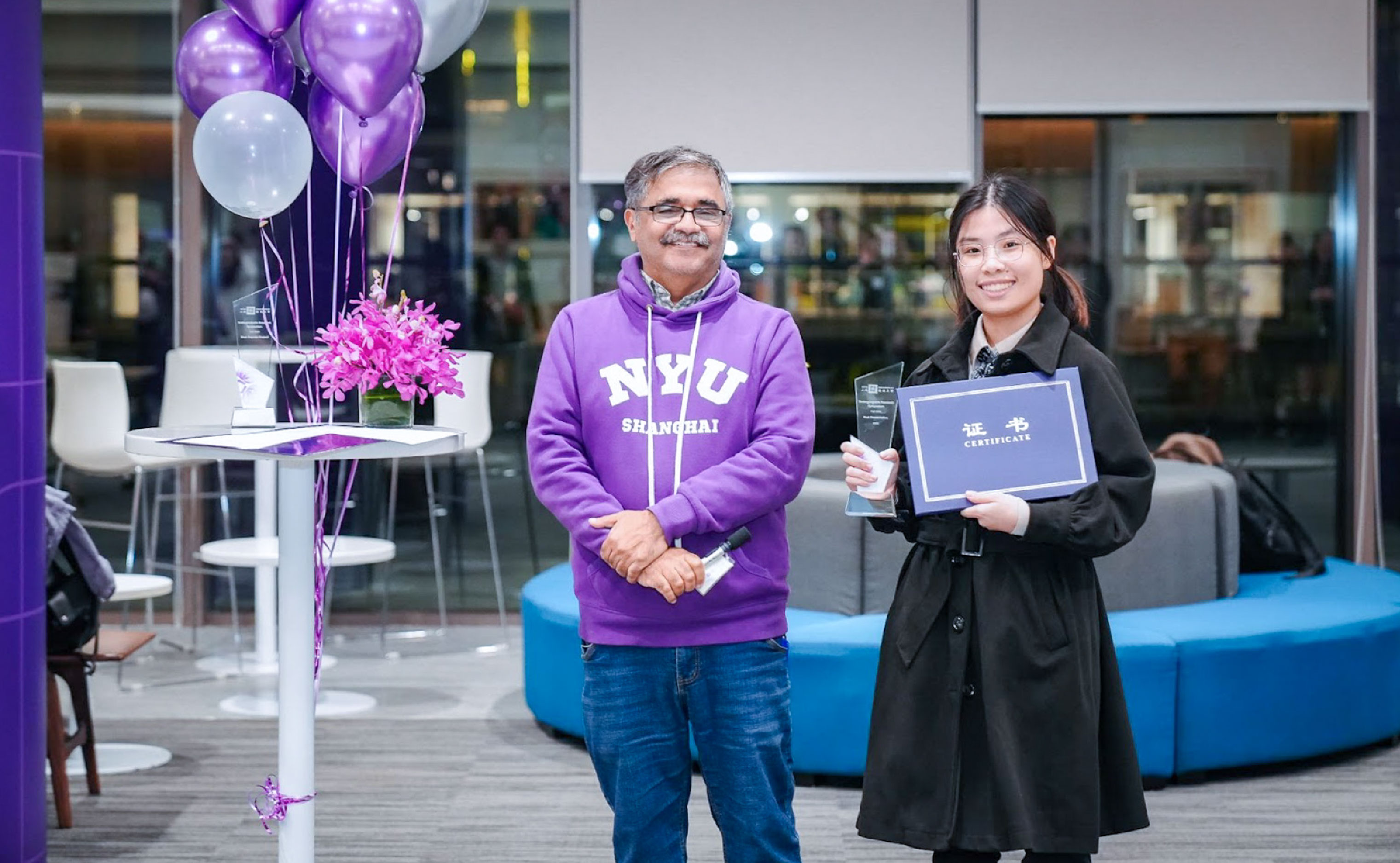
Best Presentation
Information Gain Guides Attention Allocation in Multiple Object Tracking
Researcher: Li Shucheng ’25
Faculty Mentor: Zhong-Lin Lu
What was the most challenging part of this project?
Finding a significant, clear, and approachable research question is the most challenging part. You need to "think out of the box" and also be very specific. I had been working on this back and forth with my mentor for several months.
What did you learn from this research and presentation experience?
I improved my modeling skills, coding skills, presentation skills, and most importantly, the ability to identify a research question and tackle it step by step. I used the insight from my research [about human attention] to grab my audience and try to maximize the information gained in my presentation. I will continue to apply these techniques in my future presentations.
What was it like working with your faculty mentor?
Professor Zhong-Lin Lu is very knowledgeable, kind, and supportive. He encouraged me to be very active and independent in my research. In most cases, when I had some challenges, he never told me the way directly, but he would guide me and give me instant feedback on whether I was on the right track or not.
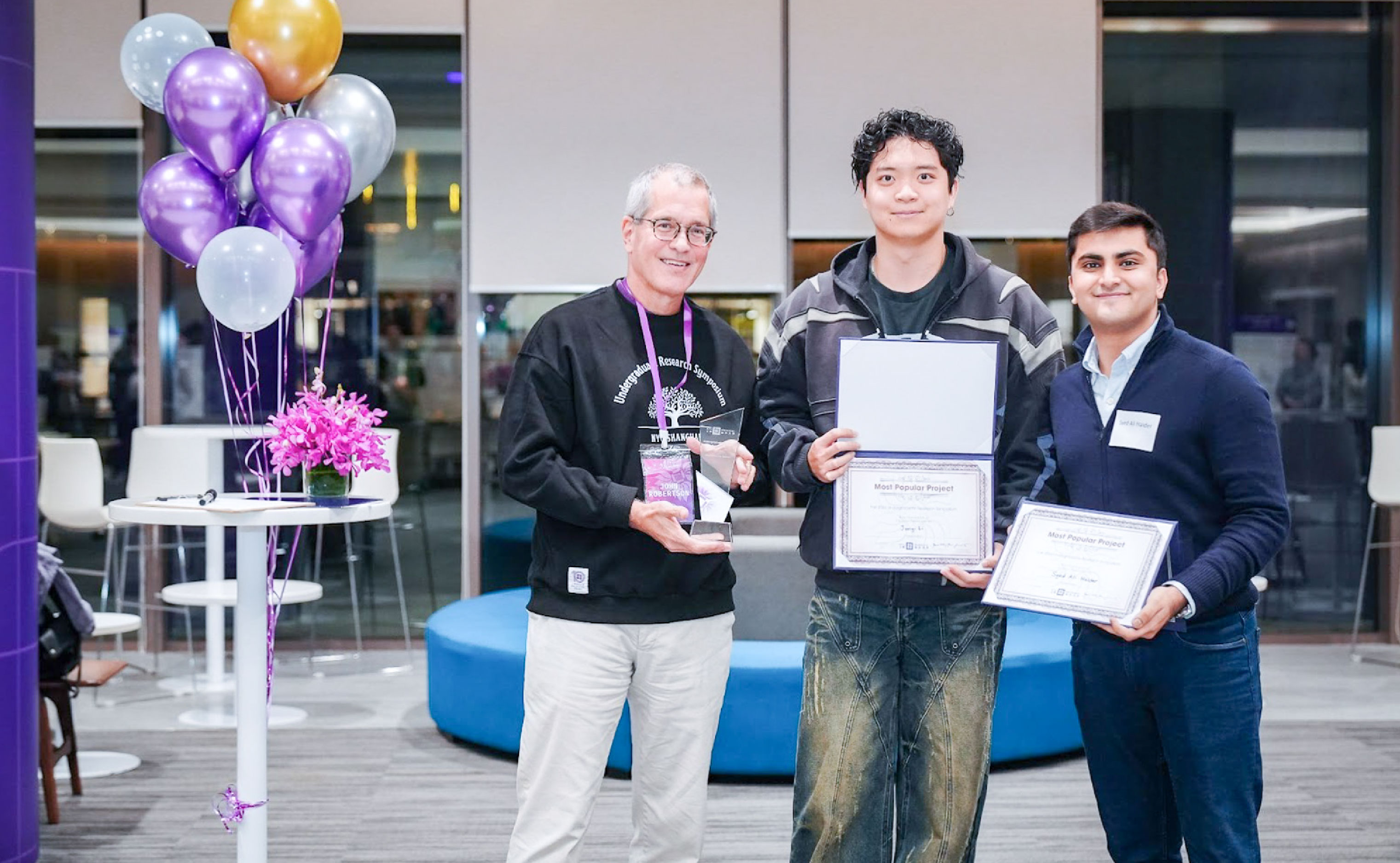
Most Popular Project
MAE-BERT VQA: A Hybrid Model for Visual Question Answering
Researchers: Syed Ali Haider ’25, Li Junyi ’25
Faculty Mentor: Guo Li
What did you learn from this research and presentation experience?
Syed Ali Haider: I learned that research can feel overwhelming, especially as a beginner, but breaking the work into smaller subproblems can make it manageable. By solving each part sequentially, we were able to make steady progress. Presenting our findings was also valuable, as it required us to communicate our work clearly to a non-technical audience, helping us translate technical ideas from bits and bytes into real-world impact.
What advice would you give to other undergraduate students who want to engage in research?
Start early, get involved in interesting courses, and build relationships with professors you’d like to work with. Don’t feel pressured to rush—start small and let your passion guide you. NYU Shanghai’s collaborative environment is incredibly supportive; when I was a sophomore, I was intimidated by research but discovered it mostly takes dedication and coffee! My advice is to focus deeply on one or two labs during your undergraduate years, rather than dabbling in too many projects.
What was it like working with your faculty mentor?
Despite her busy role as the area head of Data Science, Professor Guo Li prioritized our project, meeting with us regularly to provide invaluable guidance. She also helped us secure the Dean’s Undergraduate Research Funding, making it possible for us to focus intensively over the summer. Her iterative, constructive feedback throughout the research helped us refine our approach and think critically about our methodology. She connected us with key resources, shared her expertise in computer vision, and encouraged us to explore innovative ideas. Having a supportive mentor is invaluable, especially for a junior researcher and can significantly boost the chances of a successful research outcome.


